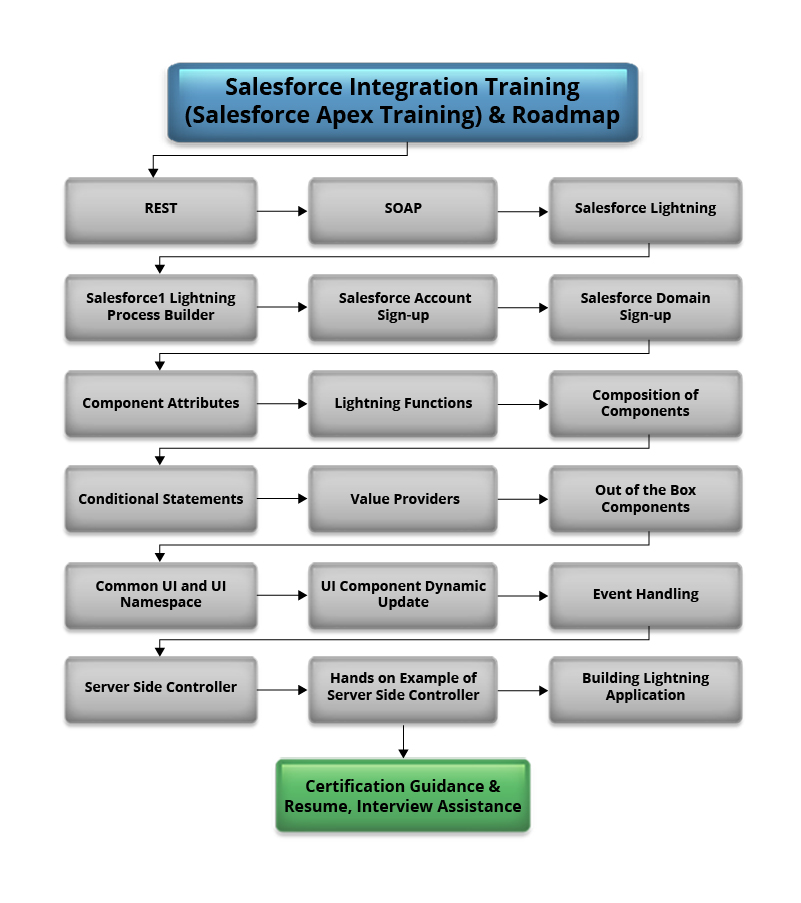
Dhiraj Deo
I got the industry expert trainer from ZaranTech for my salesforce apex training. The immediate response from the team and trainer for all my queries.
ZaranTech's Salesforce Integration Training will help you master various concepts like SOAP, APIs, REST, Salesforce Lightning, Salesforce account sign-up, using CSS style and HTML, lightning functions, conditional statements, value providers, event handling, building lightning applications, etc. In this Salesforce Integration Certification, you will gain hands-on experience in various technologies by engaging in several real-life projects in domains of finance, e-commerce, banking, entertainment, etc. So, get the best online Salesforce Integration course from top Salesforce Developers.
Introduction to REST API, Apex callout to an external service, , calling an external service, sending a HTTP request, HTTP callout using REST with JSON, downloading Eclipse and configuring for customized IDE, Force.com plug-in to integrate with the Eclipse, deploying the OAuth protocol, authenticating using OAuth before making the REST API calls, creating a connected App, specifying the app general information, Apex REST support for JSON and XML formats, defining variables of the user-defined type, creating URL, posting HTTP and parsing JSON response, executing the code.
Salesforce Lightning collection of tools and technologies, modern user interface for speed optimization, Lightning Experience, building reusable components to customize Lightning Experience, Salesforce1 Mobile App.
Introduction to Salesforce1, action layouts for Salesforce1, Lightning Process Builder, creating process using visual layout, create whole process rather than using multiple workflow rules, process for working together in one UI for different users.
Two types of free accounts, lifetime free developer account, 30 days trial production account, understanding how to sign up for the lifetime free developer account, account creation at https://developer.force.com.
Creation of custom domain in Salesforce, defining of custom domain name for the organization at https://
Using CSS and HTML for styling Lightning Components, referencing Components in Lightning App, creating CSS file in Developer Console, linking to Lightning Component, uploading external style sheet to static resource.
Understanding what attributes are, member variables in Apex Class, typed fields on a specific instance of a component, referencing from within Component’s markup using expression syntax, making components dynamic with attributes, using aura:attribute> tag to add attribute to component or app.
Understanding client side controller, defining functions, binding to components, passing value to functions and other JavaScript based operations, defining attribute in application, referencing component in application.
Creating fine-grained components in larger components, fitting components together, creating simple components like c:LC and c:LC2, creating wrapper component c:wrappercomp containing simple components.
The IF Else conditional statement, aura:if, isTrue expression, instantiating components in either its body or the Else attribute.
Accessing data using Value Providers, encapsulating related value together, the value providers for a components v (view) and c (controller).
Using out-of-the-box components for Salesforce1, Lightning Experience, Lightning Apps, components belonging to different namespaces, Aura, Force, force Chatter, force Community, lightning design system styling, lightning namespace components, user interface.
Understanding common UI, using aura:component, UI components such as ui:input and ui:output, easy handling of common UI, component styling and extension.
Dynamically updating UI components, JavaScript controller actions for firing events in Lightning Component Framework, event declaration using aura:event tag in a .evt resource.
Event-driven programming using JavaScript, Java Swing, the component event and application event, writing handlers in JavaScript controller actions.
Creating server side controller in Apex, @Aura Enabled annotation, annotation to enable client and server-side access to controlled method, calling a server-side controller action from a client-side controller.
A real example of deploying Server side controller by pulling data from Opportunity object, creating Client side controller to invoke Server side controller and passing the returned value to components.
Building Contact Management App on Lightning Framework, uploading CSS file and uploading it to static resource for referencing in application, creating contact Controller Apex Class, pulling data from contact and returning the list of contacts, designing User Interface by using HTML and CSS Classes provided in Bootstrap Style sheet.

Salesforce Integration Training (Salesforce Apex Training) has actually taken a breakthrough in SalesForce innovation and is one of the most wanted modules for large organizations has the SalesForce system implemented. This certification exam verifies that the candidate has the knowledge of the area of Global Traded Transactions for the consultant profile. This certificate proves that the candidate has a basic understanding within this consultant profile, and can implement this knowledge practically in projects. Also, this certificate builds on both the basic knowledge gained in related Salesforce Integration Training (Salesforce Apex Training) and documentation, as well as on practical experience gained as a member of a Salesforce Integration Training (Salesforce Apex Training), where the candidate would apply this knowledge practically in projects. This also helps you master the key technical skills and gain the ability to crack the interviews.
Certificate of Completion(Sample)

Yes, you get a ZaranTech Certificate of completion which you can showcase in your Linkedin profile and resume.
Yes, we do. We offer corporate training for all Salesforce modules.
With our Instructor-led Live Online training program, all sessions are recorded. These recordings are posted in the LMS for your later use.
Yes. We provide the training course materials access for Lifetime using the LMS.
Yes, we do for weekend batches and group participants of more than 3.
Here are the relevant SalesForce Developer Job Titles:
The average salary for “Salesforce Systems Integration Specialist” is $105,901 per year.
The following are the roles & responsibilities of Salesforce Integration Developer:
This is comprehensive training course in Salesforce Apex Integration. You will learn SOAP and REST APIs, various aspects of invoking external web services from the Force.com platform, creating web services from within the Apex code.
What will you learn in this training?
There are no prerequisites for taking up this Salesforce Apex Integration training course.
ZaranTech’s Course Completion Certificate will be awarded upon the completion of the project work (after the expert review) and upon scoring at least 60% marks in the quiz.

Sign in with Social Account
Login With FacebookLogin With twitterLogin with Google Plus